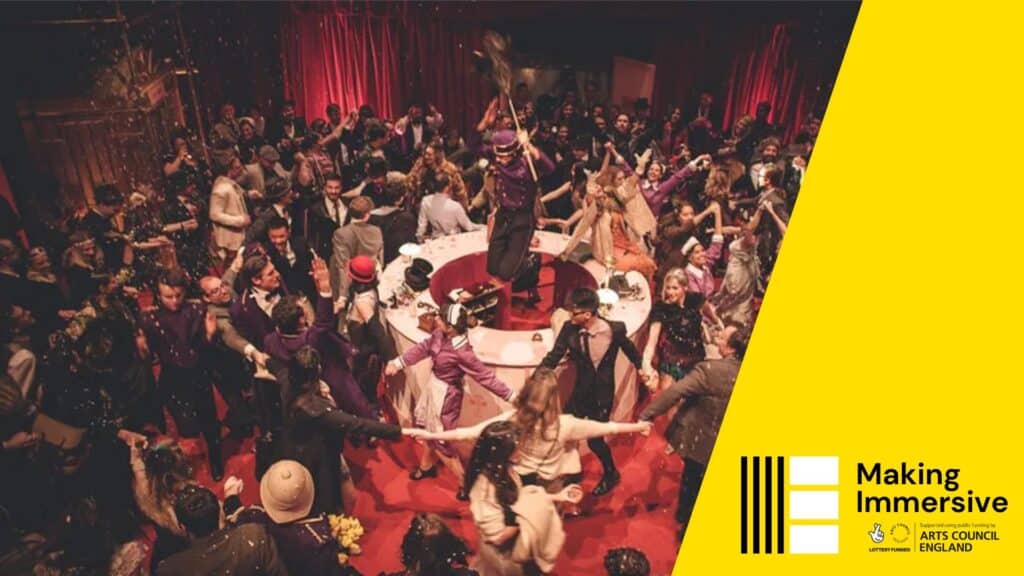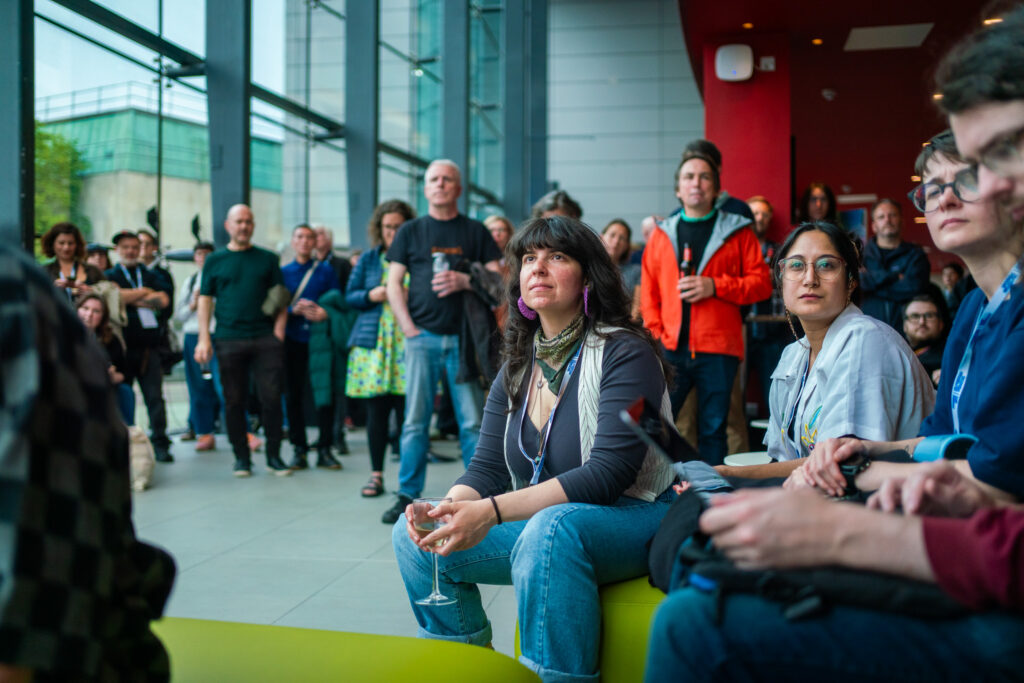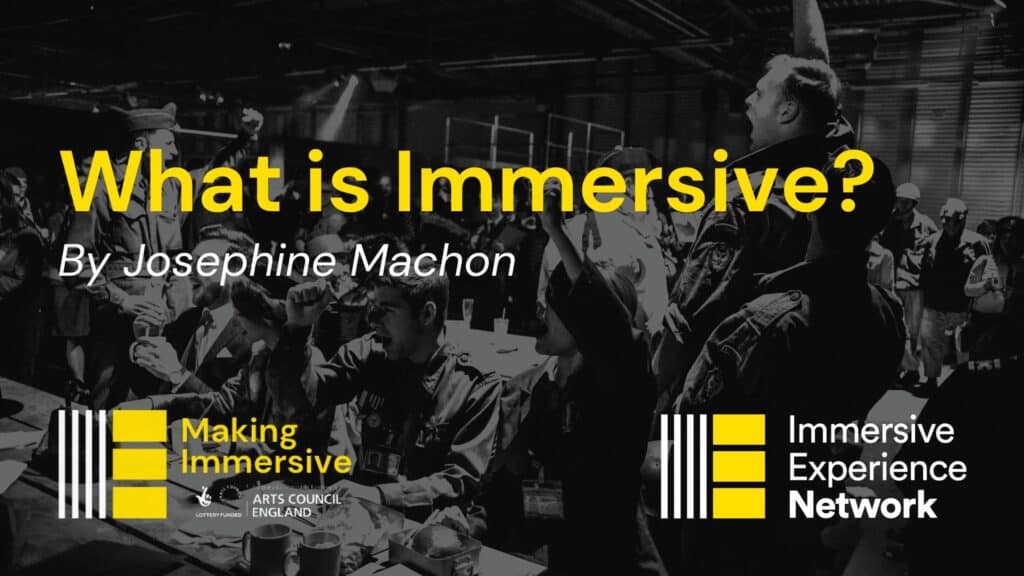Immersive theatre can be a mysterious scene to enter! But if you’re interested in getting involved, I can offer you some veteran’s advice to get you going. I’ve worked in immersive for about 8 years now, and done everything from large scale shows like Secret Cinema to corporate walkabout gigs in the back of a pub. Here are a few things I’ve learnt along the way.
How to find roles in Immersive Theatre
Honestly, the world of immersive is an incredible family of brilliant creatives, but it can be a cliquey one to get into. Networking is invaluable! Castings for the very large scale shows will tend to show up on Spotlight, but smaller productions often cast through an existing network and word of mouth. Here are some ideas for getting a foot in the door!
Start by researching who is making immersive work and following on socials – not just companies, but follow the individual creatives within them (producers, directors etc). This will be a great way to find out about a few things:
- Castings themselves
- Immersive-specific networking events
- Friends and family shows/test performances. You can’t get an immersive show off the ground without trying it on an audience, so most shows will do ‘test runs’ with a friendly audience before they open to the general public. These are a brilliant place to a) meet people and b) learn by watching and listening
Aside from these, try to get along to see immersive work. Tickets can be VERY expensive, so look for smaller companies with more affordable prices too. Stick around at the end to have a chat with cast/crew if you can.
Think about the adjacent skills that might get you an edge. Improv comedy and devising are particularly useful, but other great skills might be: clowning, circus, singing/instruments, cabaret performance, event or stage management, sound/LX and stage combat.
Lastly, look for shorter term gigs with a lower barrier to entry. Many of us got our start at Boomtown Fair (there are a bunch of different companies running crews there), and walkabout performance. Facebook groups aimed at immersive performers or festival crews can be a great source for these. Working jobs other than cast such as front of house or bar is also a brilliant way to get to know people – I got my start in immersive working on the bar for Secret Cinema and just picked the brains of everyone I met about how to work my way up.
Immersive Auditions
Any company worth its salt is going to have a workshop style audition where they ask you to improvise – you’ll probably need to devise something in the room, and work with a mock ‘audience’.. They are looking for you to:
- Work as a team with the other actors in the room
- Centre the audience experience
Remember that immersive is about what the audience gets to do, not what they get to stand still and watch, so try to give your audience a job, ask them questions, and involve them as much as possible. For the love of all that is improv, work with the other actors – don’t be the person that obnoxiously shouts over everyone. Show you can be generous and collaborative. Make bold character choices – rarely do very subtle naturalistic performances work in an immersive environment – but avoid being overly hammy if that doesn’t seem like the tone. If the show is based on an existing IP then study the source material and play to that, but don’t go in with too set an idea on a particular role. They’re probably looking for people that can multi-role so try to show them several facets of what you can be.
The audition process will tell you a lot about the company. If they don’t seem to be assessing for the things above, then beware. It may mean that they’re not experienced! Do your research about the company and their reputation.
What to expect when you’re in
Immersive is wildly different from traditional theatre. As yet there is no Equity agreement for immersive contracts, so read your contract carefully. While Equity will absolutely support you as a member, there is a limit to what they can do in terms of working conditions. With the boom in immersive there are a lot of production companies entering the field without much experience, and everyone is working with tight budgets in a competitive scene.
The hours are likely to be longer, and it may be physically, emotionally and vocally way more demanding. You’re competing to be heard over background noise for hours, while trying to hold the attention of an audience surrounded by distractions, and staying focussed enough to deal with unexpected things happening at any moment. You’ll probably lose your voice, and get sick (close proximity to audience members will see to this) so make sure your contract includes sick pay. Be prepared to advocate for your needs as conditions can be less than ideal.
It can be repetitive – if you’re on a ‘carousel’ show you might be doing the same scene on repeat for hours. But you also need to be prepared for a level of unpredictability you won’t encounter anywhere else. I’ve had to vamp with an audience for ten minutes because someone else was running late for their cue! There is so much more that can go wrong in immersive. The more you embrace the curveballs as a fun challenge as opposed to something that gets in your way, the better time you’ll have. It’s exciting never really knowing what is coming next, and so rewarding finishing a show knowing you skillfully handled the unexpected and gave the audience a great time!
Expect there to be a bedding in period while the show gets off the ground. Remember those ‘friends and family’ shows I mentioned? They’re vital, and what you come up with in rehearsals may be wildly different from the show you have after two or three weeks trying with an audience. I’m yet to work on a large scale show that had even finished all the build by the time it was open. See all the change in the beginning as a creative challenge to adapt. Remember you are a team, working with a live audience. Collaborate with your cast on what works and stay flexible.
Working with a live audience can be a joy, but is a totally new skillset. Every person that walks through the door is going to behave differently. My advice is to see it as your job to adjust your performance to meet your audience where they are. It’s easy to start seeing audiences as ‘good’ or ‘bad’ but I have found if you’re struggling with someone they’re often either confused about how to play, or they just don’t want to have the kind of fun you’re trying to give them. There’s so much reward in getting a difficult audience onside. There obviously limits here though – everyone deserves to feel safe and it’s not your job to pander to people who are being truly obnoxious or unsafe.
The greatest tip I can give you is to steal like hell! The best immersive performers I know are openly and lovingly taking ideas from each other all the time. Talk about what you’re doing, watch each other, and magpie performance ideas from your cast mates. Look, be reasonable and don’t just straight up nick a joke you know someone else is going to tell later in the show, but in any experienced crew you can bet we’re all sharing our ideas and building on them. Take that great one-liner you heard about why there are PDQ machines in your 1920s world and run with it. And ask your experienced cast mates for advice, they’ll probably be happy to share the things they’re using in the show. It’s all for the greater good.
Thoughts for producers/directors working with immersive performers
Please remember immersive performance is way more intense than any regular job! Don’t expect your performers to work eight or ten hour days with a half hour break. Just because there isn’t an Equity agreement and you could ask for that doesn’t mean you should.
Try to anticipate your performers’ needs early in the design process, before you get stuck on an idea that is going to make life really hard for them! I’ve been in too many shows where we’re having to fight because the sound levels are already set too loud, or the time codes for the show were worked out before anyone thought about how long it really takes to move 20 unruly people through a small doorway!
Lastly, trust your performers to come up with brilliant content when you get them in a rehearsal room. I’ve seen many shows where there is a huge script written before any actors get involved. I understand it must be anxiety-inducing to be in the late stages of production without knowing what your content is, but make sure you leave space for your performers to interact and improvise rather than just reciting what they’ve had to memorise.
I hope all this helps, and best of luck on your immersive journey!





